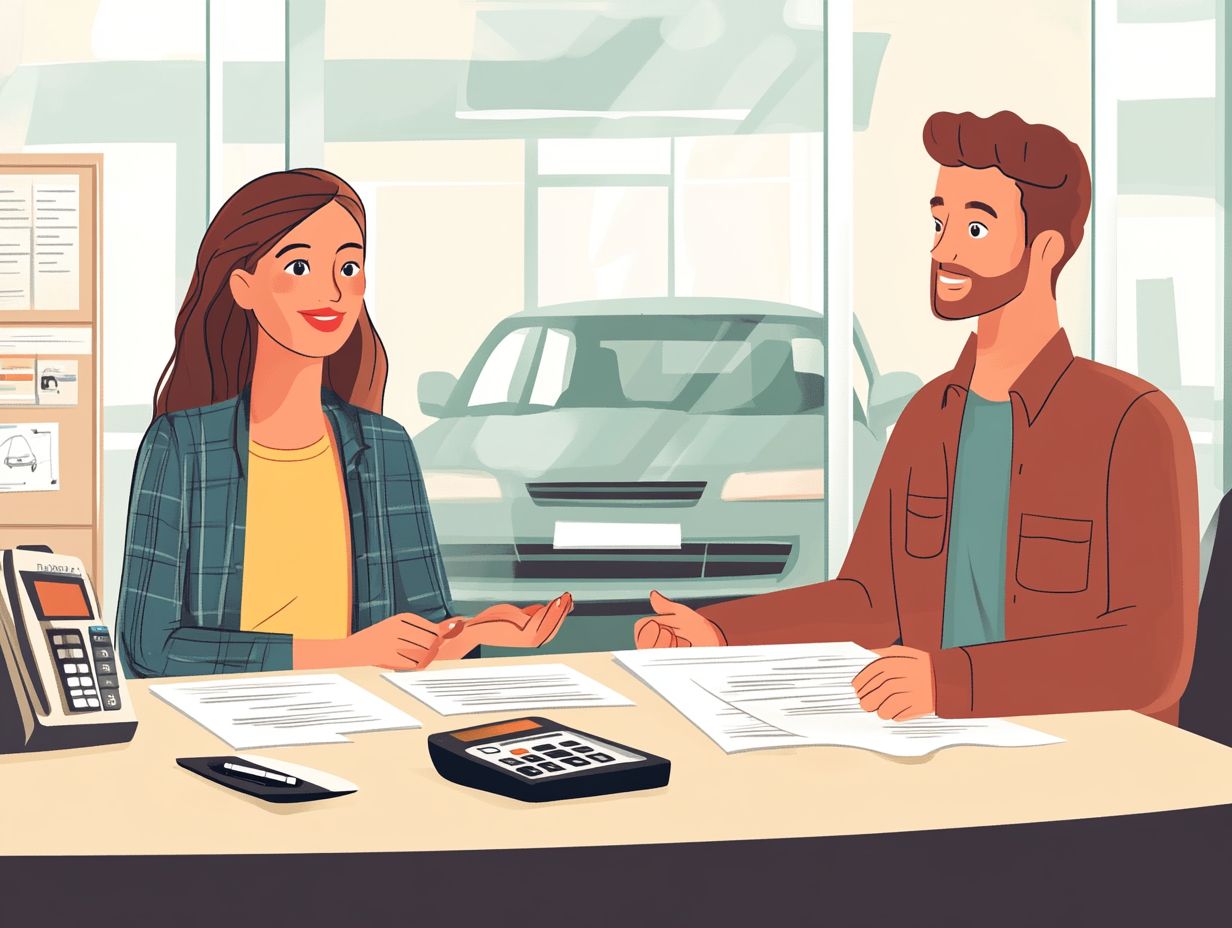How to Negotiate with Car Dealerships
Negotiating with car dealerships might seem daunting, but it doesn’t have to be.
This guide will walk you through the entire process, from researching your ideal vehicle and understanding market trends to crafting a robust budget. Get ready to discover essential tips that will empower you! You ll learn how to build rapport with dealers, implement effective negotiation strategies, and navigate the common tactics employed by salespeople.
By the time you reach the end, you ll be ready to confidently close your deal, ensuring you secure the best value for your investment.
Are you prepared to drive a hard bargain? Let s dive in!
Contents
Key Takeaways:

Do your research before negotiating with a car dealership to have a better understanding of the market. Set a budget to know your limits. Establish trust and use negotiation tips for used car buyers to build rapport and secure a better deal. Be aware of common dealer tactics, such as pressure tactics and hidden fees, and know how to respond to them to avoid being taken advantage of.
Negotiating with Car Dealerships: An Overview
Negotiating with car dealerships may seem overwhelming, but learning how to prepare for a car negotiation can save you money.
Equip yourself with knowledge about the MSRP (Manufacturer’s Suggested Retail Price), which is the price recommended by the car manufacturer. Leverage research data from reputable sources like Kelley Blue Book and Edmunds.
Familiarize yourself with financing options, such as preapproved financing (getting a loan before shopping) and competitive bids. This will give you power as you enter negotiations. Additionally, consider negotiating the best price on your new car by shopping around for the best out-the-door price, taking into account trade-in value and dealer fees.
Remember, knowing when to walk away from no-haggle dealers is crucial. With the right preparation, you can approach the process with confidence and poise.
Understanding the Process
Let’s break down the steps to mastering your negotiation. Understanding how to negotiate the car price with a dealer is essential for anyone looking to secure an advantageous deal. For instance, consider these tips for negotiating with online dealers. Your journey typically begins by researching market values, giving you a solid foundation for entering discussions.
As negotiations progress, the dealer will likely emphasize the vehicle’s features and try to persuade you of its worth. Stay alert to various dealer fees that can inflate the final price.
Being familiar with common negotiation tactics, such as starting with a lower offer, will give you the power to counter the dealer’s strategies effectively. Knowing what to say when negotiating car prices allows you to navigate the conversation with confidence and insight.
Preparing for Negotiations

Preparing for your car shopping experience requires diligent research and financial readiness. This ensures you are fully equipped to negotiate with confidence and clarity.
Researching the Car and Market
Researching the car and market is essential for grasping the true value of a vehicle and ensuring you avoid overpaying. By taking the time to delve into the Manufacturer’s Suggested Retail Price (MSRP) and current market trends, you can significantly elevate your buying experience.
Utilizing reputable platforms like Edmunds or Kelley Blue Book grants you access to a wealth of information. This enables you to compare various vehicles side by side. These resources offer valuable insights into pricing history, expert reviews, and user experiences, helping you pinpoint which car delivers the best value for your money.
Armed with this knowledge, you can make informed decisions, negotiate with confidence, and ultimately secure a purchase that aligns with your budget and expectations.
Setting a Budget and Knowing Your Limits
Setting a budget and understanding your limits is an essential step in the car-buying journey. This ensures you avoid overspending and unnecessary financial strain.
By carefully analyzing financing terms, potential monthly payments, and the total out-the-door price, you gain a clearer perspective on what you can realistically afford.
Look beyond just the car’s sticker price. By factoring in additional costs like sales tax and dealer fees, you’ll achieve a comprehensive view of your financial commitment.
This approach helps you stay within your budget and allows you to sidestep unexpected expenses that could arise later.
With a well-defined estimate of all associated costs, making informed decisions will come much more easily.
Tips for Negotiating with Car Dealerships

Successful negotiations with car dealerships depend on effective strategies that prioritize building rapport and trust with the salesperson, as highlighted in the art of negotiating car prices.
Building Rapport and Establishing Trust
Building rapport and establishing trust with the salesperson can elevate your negotiation experience and outcomes. Good relationships lead to open communication, allowing for honest talks about pricing, product features, and potential compromises.
When you feel comfortable expressing your needs and concerns, salespersons are more inclined to offer tailored solutions that align with your objectives. This mutual transparency leads to better deals and helps uncover hidden offers or incentives that might otherwise stay under the radar.
Taking a collaborative approach transforms the transactional nature of sales into a partnership. This paves the way for long-term benefits and ongoing support beyond your initial purchase.
Using Negotiation Tactics and Strategies
Utilizing effective negotiation tactics and strategies is crucial when dealing with car dealers to secure the best price possible. Knowing how to stay calm during car negotiation and understanding the details of competitive bidding can profoundly influence the final cost.
As a buyer, presenting reasonable offers grounded in thorough research demonstrates your awareness of market values and strengthens your position at the negotiating table.
Know how and when to walk away; this can be a powerful asset. It signals to the dealer that you’re not desperate for a sale. By leveraging competing offers from other dealerships, you create a sense of urgency and pressure that can compel them to rethink their pricing. For more valuable insights, check out these negotiation tips for luxury car buyers.
Approaching the situation prepared, calm, and strategic can save you a lot of money!
Dealing with Common Dealer Tactics

Navigating the landscape of common dealer tactics demands awareness and preparation on your part. By staying alert, you can effectively manage pressure tactics and uncover any hidden fees that may arise.
Identifying and Responding to Pressure Tactics
Identifying and responding to pressure tactics from car dealers can be challenging, but mastering this skill is essential for successful negotiations. Understanding what to expect in a car negotiation will help you know these tactics and secure a fair deal.
These tactics may involve creating a sense of urgency, employing emotional appeals, or presenting misleading information. Dealers often pressure you into snap decisions by emphasizing limited-time offers or exaggerating the popularity of a particular model.
By recognizing these strategies, you can prepare effective counter-responses, such as:
- Taking a step back to assess your options,
- Calmly asking for clarification,
- Being ready to walk away if the situation becomes too high-pressure.
Maintaining your composure and assertiveness can shift the balance, allowing you to take control during the negotiation process.
Handling Add-Ons and Hidden Fees
Handling add-ons and hidden fees is crucial to achieving a transparent and fair out-the-door price when negotiating with car dealers. It s essential to meticulously examine each line of the sales contract before committing.
Many dealers may try to slip in unnecessary add-ons, like paint protection or rustproofing, significantly inflating the overall cost. Hidden fees, such as dealer documentation charges or excessive sales tax, can easily catch you off guard.
By understanding these potential pitfalls, you can navigate the complexities of pricing and feel confident that you re securing a reasonable and fully transparent deal. Taking the time to question every charge will lead you to make smarter buying decisions.
Finalizing the Deal
Finalizing the deal marks the culmination of your car-buying journey, where all negotiations come together into the agreed-upon price and terms of the contract.
This pivotal moment is where your efforts and decisions converge, sealing the arrangement that sets the stage for your new vehicle. You ve done the hard work; now it s time to celebrate your new ride!
Negotiating the Final Price and Terms
Negotiating the final price and terms of your vehicle purchase is a critical step that can profoundly impact your overall investment. Being well-prepared and aware of dealer tactics in negotiation can make all the difference in securing a favorable deal.
You should enter negotiations armed with research on market prices and available car rebates. These incentives can significantly reduce your overall cost. Understanding the details of how you will pay for the vehicle is vital, as varying interest rates and loan durations can drastically affect your monthly payments and total financial commitment.
Approaching negotiations with a clear grasp of these components not only gives you the power but also fosters a smoother dialogue. This can ultimately lead to a more satisfying purchase experience.
Reviewing and Signing the Contract
Reviewing and signing the contract is the final step that finalizes your deal with the dealership, so it’s essential to pay close attention to every detail.
This moment is critical; it s where all your discussions and negotiations come together in written form. Ensure that every term aligns with what you originally agreed upon.
Any mistakes might cause confusion or even financial implications later on. You should carefully check for accuracy in pricing, fees, and any warranties mentioned during negotiations.
Taking the time to thoroughly review all documents before putting pen to paper will help you prevent future issues. You’ll gain peace of mind, knowing that your expectations have been met.
Frequently Asked Questions
- What is the best way to start negotiating with a car dealership?
The best way to start negotiating with a car dealership is to do your research beforehand. Know what type of car you want, its market value, and any additional features or packages you are interested in. This will give you a strong starting point in negotiations. - Is it possible to negotiate the price of a new car?
Yes, it is possible to negotiate the price of a new car. In fact, most car dealerships expect some form of negotiation and often have room to lower the price. Use your research and negotiating skills to try and get the best deal possible. - Should I negotiate the price before or after test driving the car?
It is generally recommended to negotiate the price of a car after test driving it. This will give you a better understanding of the car’s features and how it drives, allowing you to negotiate more effectively. - What are some effective negotiation tactics to use at a car dealership?
Some effective negotiation tactics to use at a car dealership include staying calm and polite, being willing to walk away, and negotiating on the price of the car rather than monthly payments. It is also helpful to have a specific target price in mind and stick to it. - Can I negotiate the price of a used car?
Yes, you can negotiate the price of a used car. However, keep in mind that used cars typically have less room for negotiation compared to new cars. It is important to do your research and have a thorough inspection of the car before negotiating to ensure you are getting a fair price. - Are there any additional factors besides the price that can be negotiated at a car dealership?
Yes, there are other factors besides the price that can be negotiated at a car dealership. These include trade-in value, financing terms, and additional fees such as documentation or delivery fees. Be sure to read and understand all documents before signing to avoid any surprises.






